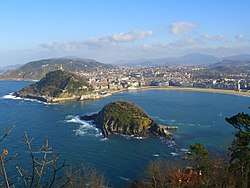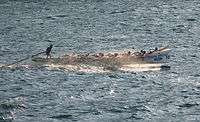Kontxako Bandera
The Kontxako Bandera (Basque) or Bandera de la Concha (in Spanish, meaning "Flag of the Kontxa") is one of the oldest and most famous estropada race along the Bay of Biscay, held annually in the Kontxa, the main bay of San Sebastián, Spain. It takes place on the first two weekends in September and regularly draws crowds of more than 100,000 people and around 20 rowing teams. It was first held in 1879 and has been held most years since with the main exception of the war years.

In Galician it's called Bandeira da Cuncha and Drapeau de La Concha in French.
Background
Estropadak is a very popular form of rowing competition common all along the coast of the Northern coast of the Iberian Peninsula.
A crew is made up of thirteen oarsmen and the cox, who faces them at the stern. The boats are called traineru (trainera in Spanish, trainière in French) and are derived from 19th century fishing boats.
This is the most important competition in the Bay of Biscay and takes place the first two Sundays in September, within the framework of the Basque Week, with the best teams from all along the Northern coast competing against each other.
The teams must row three nautical miles to a buoy, turn around and return to the starting line. So instead of the normal four lengths, teams only do two lengths in this race.
The final always consists of two races between the eight finalists. To qualify, all teams bar one must take part in a race against the clock on the first weekend, the seven best of which go forward to the finals the following weekend. The eighth team is always from the host town and does not have to qualify. In the finals, the eight teams race in two groups of four across the same distance again.
For example, in the 2007 race there were 21 teams taking part:
| Team | Time to buoy | Time to finish |
| Hondarribia | 11:12 | 20:56 |
| Urdaibai | 11:15 | 20:58 |
| Zarautz | 11:15 | 21:00 |
| Orio | 11:04 | 21:02 |
| Castro | 11:18 | 21:09 |
| Pedreña | 11:15 | 21:09 |
| Tirán | 11:16 | 21:10 |
| Pasai San Pedro | 11:25 | 21:19 |
| Zumaia | 11:31 | 21:20 |
| Laredo | 11:16 | 21:26 |
| Getaria | 11:32 | 21:43 |
| Pasai Donibane | 11:40 | 21:50 |
| Arkote | 11:34 | 21:54 |
| Isuntza | 11:42 | 21:54 |
| Mecos | 11:43 | 21:55 |
| Cabo da Cruz | 11:43 | 21:56 |
| Sestao | 11:43 | 21:57 |
| Ondarroa | 11:56 | 22:08 |
| Camargo | 11:51 | 22:17 |
| Hernani | 12:46 | 23:44 |
| Urki | 12:48 | 23:49 |
Of these, the top seven went into the final which Orio won with a time of 19:16.68.
Statistics
- The most successful teams in the Kontxako Bandera are Orio (32 flags), Pasai San Pedro (15 flags), San Sebastián (14 flags), Hondarribia (13 flags) and Pasai Donibane (10 flags).
- The fastest times were achieved by Castro Urdiales (18:59.94 in 2006) and El Astillero (19:05.02 in 2006 and 19:09.10 in 2005)
Winning teams
Listed here after their town with the name of the team given in brackets:
1879-1900
- 1879 San Sebastián
- 1880 Pasai San Pedro
- 1881 Hondarribia
- 1882 -
- 1883 San Sebastián
- 1884 -
- 1885 -
- 1886 -
- 1887 San Sebastián
- 1888 -
- 1889 San Sebastián
- 1890 San Sebastián
- 1891 San Sebastián
- 1892 San Sebastián
- 1893 -
- 1894 San Sebastián
- 1895 Getaria
- 1896 Getaria
- 1897 San Sebastián
- 1898 Ondarroa
- 1899 Pasai San Pedro
- 1900 Getaria
1901-1950

- 1901 Orio
- 1902 -
- 1903 Getaria
- 1904 -
- 1905 -
- 1906 Pasai San Pedro
- 1907 -
- 1908 -
- 1909 Orio
- 1910 Orio
- 1911 Getaria
- 1912 -
- 1913 -
- 1914 -
- 1915 San Sebastián
- 1916 Orio
- 1917 Pasai San Pedro
- 1918 San Sebastián
- 1919 Orio
- 1920 San Sebastián
- 1921 Pasaia (La Unión)
- 1922 San Sebastián
- 1923 Orio
- 1924 Pasai Donibane
- 1925 Orio
- 1926 Ondarroa
- 1927 Pasai San Pedro
- 1928 Pasai San Pedro
- 1929 Pasai San Pedro
- 1930 Pasai San Pedro
- 1931 Pasai San Pedro
- 1932 Pasai San Pedro
- 1933 Orio
- 1934 Orio
- 1935 Pasai San Pedro
- 1936 -
- 1937 -
- 1938 -
- 1939 Orio
- 1940 Orio
- 1941 Hondarribia
- 1942 Orio
- 1943 Hondarribia
- 1944 Orio
- 1945 Pedreña
- 1946 Pedreña
- 1947 Hondarribia
- 1948 Hondarribia
- 1949 Pedreña
- 1950 San Sebastián
1951-2000
- 1951 Orio
- 1952 Orio
- 1953 Orio
- 1954 Sestao (Iberia)
- 1955 Orio
- 1956 Pasai Donibane
- 1957 Aginaga
- 1958 Orio
- 1959 Sestao (Iberia)
- 1960 Aginaga
- 1961 Pasai Donibane
- 1962 Pasai Donibane
- 1963 Pasai Donibane
- 1964 Orio
- 1965 Hondarribia
- 1966 Hondarribia
- 1967 Hondarribia
- 1968 Hondarribia
- 1969 Lasarte
- 1970 Orio
- 1971 Orio
- 1972 Orio
- 1973 Lasarte
- 1974 Orio
- 1975 Orio
- 1976 Pedreña
- 1977 Santurtzi
- 1978 Sestao (Kaiku)
- 1979 Santurtzi
- 1980 Sestao (Kaiku)
- 1981 Sestao (Kaiku)
- 1982 Sestao (Kaiku)
- 1983 Orio
- 1984 Zumaia
- 1985 Santurtzi
- 1986 Pasai Donibane
- 1987 Zumaia
- 1988 Pasai Donibane
- 1989 Pasai San Pedro
- 1990 Pasai Donibane(Koxtape)
- 1991 Pasai San Pedro
- 1992 Orio
- 1993 Pasai San Pedro
- 1994 Pasai San Pedro
- 1995 Pasai Donibane(Donibaneko)
- 1996 Orio
- 1997 Orio
- 1998 Orio
- 1999 Pasai Donibane(Koxtape)
- 2000 Orio
2001-date
- 2001 Castro Urdiales
- 2002 Castro Urdiales
- 2003 El Astillero (El Astillero)
- 2004 El Astillero (El Astillero)
- 2005 Hondarribia
- 2006 Castro Urdiales
- 2007 Orio (Orio Arraun Elkartea)
- 2008 Castro Urdiales
- 2009 Sestao (Kaiku)
- 2010 Bermeo (Urdaibai)
- 2011 Bermeo (Urdaibai)
- 2012 Sestao (Kaiku)
- 2013 Hondarribia
- 2014 Bermeo (Urdaibai)
- 2015 Bermeo (Urdaibai)
- 2016 Bermeo (Urdaibai)
- 2017 Orio (Orio Arraun Elkartea)
- 2018 Hondarribia
- 2019 Hondarribia
References
- Kontxako Bandera (Town council's web, in Basque and Spanish)
- Liga de Traineras (in Basque, Spanish and Galician)
External links
- Estropadak (in Basque)